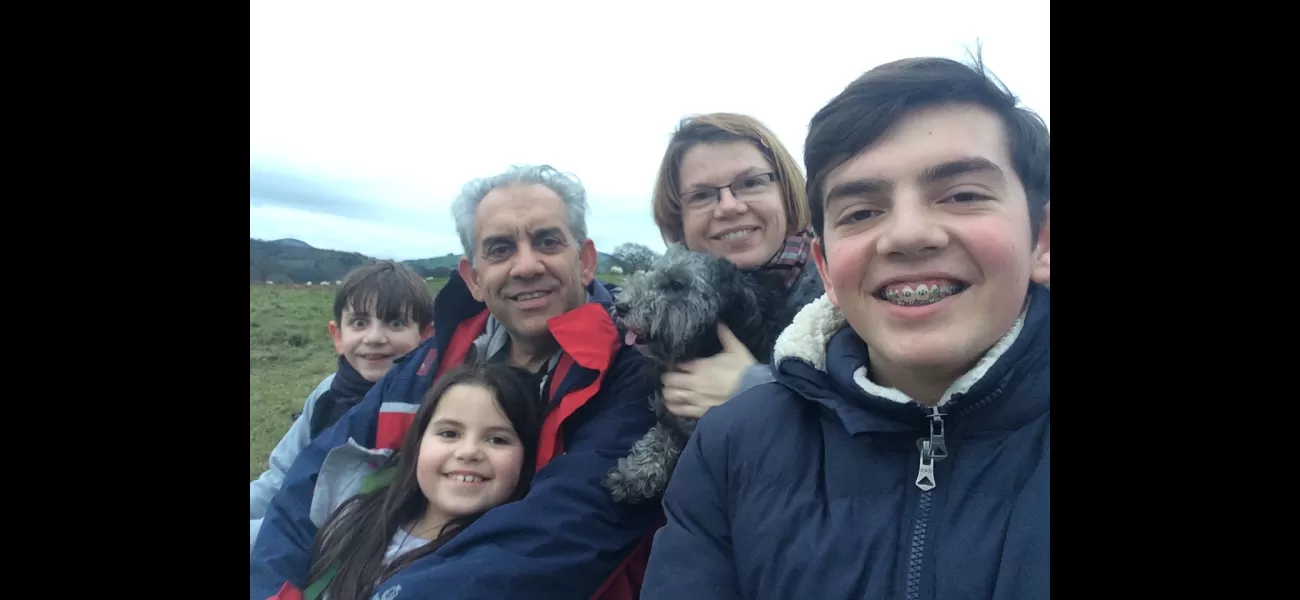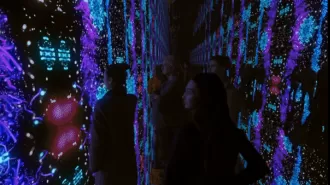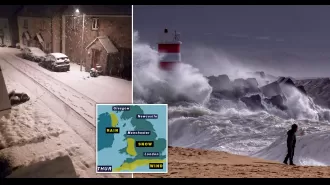No Santa in our house, no lies to kids.
December 4th 2023.

Welcome back to How I Parent, where we get a glimpse into how the nation is raising their kids. As the festive season unfolds, many children are eagerly awaiting the magical ‘S’ word – Santa. But not for Michelle Foulia, a 49 year old mother of three from North Wales.
Michelle and her husband Andreas chose to never ‘lie’ to their three children Mihalis, Vangelias and Areti about Father Christmas. “In agreement with my husband, we always told our children the truth,” Michelle tells The Agency. “We knew the various versions of the Santa story as if that justified the lies and pretences, but it still didn’t cut it. So I told my children that it was a made-up story with various roots and versions including possibly a true story of a kind man who gave away gifts. While we respected other people’s beliefs, we explained there is no such thing as a magical human that flies around on reindeer delivering gifts.”
The family says they’ve saved lots of money by not ‘buying into Christmas’. Michelle explains that while her children knew Santa wasn’t real, sometimes it would slip out to other unsuspecting friends. “Once when my daughter, Arieta, was six she was having a playdate with a boy whose parents were totally doing the Santa thing. He kept going on and on about Santa this, and Santa that. My daughter just lost it and shouted at him “There is no Santa. He’s not real!”
Michelle says she was ‘glad her daughter didn’t sacrifice her values by going along with a lie’. She goes on to explain that “neither I nor my children are responsible for upholding other people’s lies. What kind of example would I be setting my children if we opted when to pretend with others and when not to?”
Michelle and Andreas were both in alignment that they wanted to be honest about Santa. Michelle believes her unusual stance on Santa stems from certain events in her life that gave her ‘a sense of instability in terms of trust’. Tragically, she lost her parents when she was five and lived for a period of time in foster care before moving in with her grandparents on their farm, where they struggled with money and had no electricity.
Michelle says her children can trust in her as she has told them the truth about Santa. She explains that her own parenting style has been shaped by her difficult childhood. “I will always be their safe place, I’m the one person who will not lie, manipulate or conform to societal stuff for the sake of so-called entertainment or fun. I just cannot see what is fun about pretending with a lie.”
Michelle also feels there’s a hugely commercial side of Christmas that puts undue pressure on parents to perform. “Then there are letters to Santa, following Santa’s journey, tracking Santa, it’s just relentless. There is a lot of overstimulation that comes from a sensory perspective. Lights, lights, lights everywhere, in streets, on trees, in shops, and in parks!”
Michelle Foulia, a 49-year-old mother of three from North Wales, has always stuck to her guns when it comes to the festive season. When it comes to the magical “S” word, Michelle and her husband Andreas have always chosen to tell their children the truth: Santa is simply not real.
“We knew the various versions of the Santa story as if that justified the lies and pretences, but it still didn’t cut it,” Michelle tells The Agency. “So I told my children that it was a made-up story with various roots and versions including possibly a true story of a kind man who gave away gifts. While we respected other people’s beliefs, we explained there is no such thing as a magical human that flies around on reindeer delivering gifts.”
The family has saved a lot of money by not buying into the Santa lie, and Michelle’s three children - Mihalis, 20, Vangelis, 15, and Areti, 12 - have grown up understanding that the gifts under the Christmas tree were from their parents. This hasn’t stopped Areti from accidentally spoiling the Santa surprise for her playmates, however.
“Once when my daughter, Arieta, was six she was having a playdate with a boy whose parents were totally doing the Santa thing,” Michelle recalls. “He kept going on and on about Santa this, and Santa that. He had written to Santa, and they were going to follow Santa’s reindeer on the app and all the things he would be bringing him. My daughter just lost it and shouted at him ‘There is no Santa. He’s not real!’”
Despite the fallout, Michelle was glad her daughter didn’t sacrifice her values by going along with a lie. She explains: “I had told my children to be discreet where possible and not deliberately disrespect the beliefs of others. Neither I nor my children are responsible for upholding other people’s lies. What kind of example would I be setting my children if we opted when to pretend with others and when not to?”
Michelle’s unusual stance on Santa stems from certain events in her life that gave her “a sense of instability in terms of trust”. She lost her parents when she was five and lived in foster care before moving in with her grandparents on their farm, where they struggled with money and had no electricity.
“I remember my friends showing off about the gifts Santa had brought them each year,” she says. “I remember the pain of being forgotten by Santa, and being bypassed.”
Now that her children are older, Michelle is glad they can trust in her as she has always told them the truth about Santa. She has also adopted a parenting style that prioritizes her children’s safety and well-being over societal expectations.
“I will always be their safe place, I’m the one person who will not lie, manipulate or conform to societal stuff for the sake of so-called entertainment or fun,” she adds. “I just cannot see what is fun about pretending with a lie.”
Ultimately, Michelle thinks there’s a hugely commercial side of Christmas that puts undue pressure on parents to perform. She hopes more families can be honest with their children about Santa, so that everyone can enjoy the festive season for what it really is.
Michelle and her husband Andreas chose to never ‘lie’ to their three children Mihalis, Vangelias and Areti about Father Christmas. “In agreement with my husband, we always told our children the truth,” Michelle tells The Agency. “We knew the various versions of the Santa story as if that justified the lies and pretences, but it still didn’t cut it. So I told my children that it was a made-up story with various roots and versions including possibly a true story of a kind man who gave away gifts. While we respected other people’s beliefs, we explained there is no such thing as a magical human that flies around on reindeer delivering gifts.”
The family says they’ve saved lots of money by not ‘buying into Christmas’. Michelle explains that while her children knew Santa wasn’t real, sometimes it would slip out to other unsuspecting friends. “Once when my daughter, Arieta, was six she was having a playdate with a boy whose parents were totally doing the Santa thing. He kept going on and on about Santa this, and Santa that. My daughter just lost it and shouted at him “There is no Santa. He’s not real!”
Michelle says she was ‘glad her daughter didn’t sacrifice her values by going along with a lie’. She goes on to explain that “neither I nor my children are responsible for upholding other people’s lies. What kind of example would I be setting my children if we opted when to pretend with others and when not to?”
Michelle and Andreas were both in alignment that they wanted to be honest about Santa. Michelle believes her unusual stance on Santa stems from certain events in her life that gave her ‘a sense of instability in terms of trust’. Tragically, she lost her parents when she was five and lived for a period of time in foster care before moving in with her grandparents on their farm, where they struggled with money and had no electricity.
Michelle says her children can trust in her as she has told them the truth about Santa. She explains that her own parenting style has been shaped by her difficult childhood. “I will always be their safe place, I’m the one person who will not lie, manipulate or conform to societal stuff for the sake of so-called entertainment or fun. I just cannot see what is fun about pretending with a lie.”
Michelle also feels there’s a hugely commercial side of Christmas that puts undue pressure on parents to perform. “Then there are letters to Santa, following Santa’s journey, tracking Santa, it’s just relentless. There is a lot of overstimulation that comes from a sensory perspective. Lights, lights, lights everywhere, in streets, on trees, in shops, and in parks!”
Michelle Foulia, a 49-year-old mother of three from North Wales, has always stuck to her guns when it comes to the festive season. When it comes to the magical “S” word, Michelle and her husband Andreas have always chosen to tell their children the truth: Santa is simply not real.
“We knew the various versions of the Santa story as if that justified the lies and pretences, but it still didn’t cut it,” Michelle tells The Agency. “So I told my children that it was a made-up story with various roots and versions including possibly a true story of a kind man who gave away gifts. While we respected other people’s beliefs, we explained there is no such thing as a magical human that flies around on reindeer delivering gifts.”
The family has saved a lot of money by not buying into the Santa lie, and Michelle’s three children - Mihalis, 20, Vangelis, 15, and Areti, 12 - have grown up understanding that the gifts under the Christmas tree were from their parents. This hasn’t stopped Areti from accidentally spoiling the Santa surprise for her playmates, however.
“Once when my daughter, Arieta, was six she was having a playdate with a boy whose parents were totally doing the Santa thing,” Michelle recalls. “He kept going on and on about Santa this, and Santa that. He had written to Santa, and they were going to follow Santa’s reindeer on the app and all the things he would be bringing him. My daughter just lost it and shouted at him ‘There is no Santa. He’s not real!’”
Despite the fallout, Michelle was glad her daughter didn’t sacrifice her values by going along with a lie. She explains: “I had told my children to be discreet where possible and not deliberately disrespect the beliefs of others. Neither I nor my children are responsible for upholding other people’s lies. What kind of example would I be setting my children if we opted when to pretend with others and when not to?”
Michelle’s unusual stance on Santa stems from certain events in her life that gave her “a sense of instability in terms of trust”. She lost her parents when she was five and lived in foster care before moving in with her grandparents on their farm, where they struggled with money and had no electricity.
“I remember my friends showing off about the gifts Santa had brought them each year,” she says. “I remember the pain of being forgotten by Santa, and being bypassed.”
Now that her children are older, Michelle is glad they can trust in her as she has always told them the truth about Santa. She has also adopted a parenting style that prioritizes her children’s safety and well-being over societal expectations.
“I will always be their safe place, I’m the one person who will not lie, manipulate or conform to societal stuff for the sake of so-called entertainment or fun,” she adds. “I just cannot see what is fun about pretending with a lie.”
Ultimately, Michelle thinks there’s a hugely commercial side of Christmas that puts undue pressure on parents to perform. She hopes more families can be honest with their children about Santa, so that everyone can enjoy the festive season for what it really is.
[This article has been trending online recently and has been generated with AI. Your feed is customized.]
[Generative AI is experimental.]
0
0
Submit Comment





